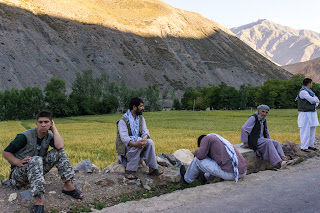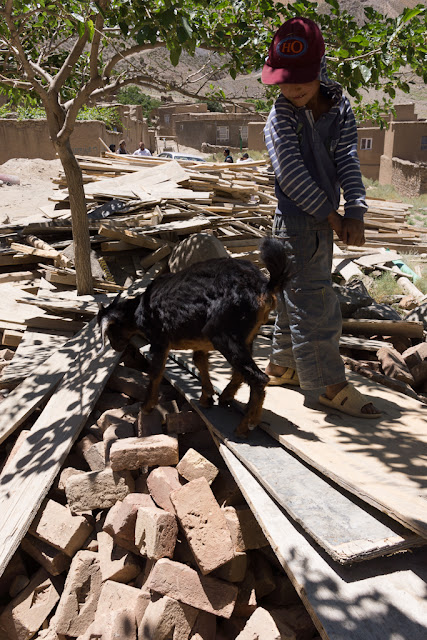I took a little road trip to Panjshir yesterday with a tailor from down the street, his relative (can't remember know if cousin or brother-in-law), and a female Indian grad student who communicated with the tailor in funny half-English Hindi (("depend kerta hai" "kaafi cute hai"--Bengali's her first and English her second language) that he sometimes kinda understood.
Trying to pass for local in New Balance sneakers:
The road through most of the valley has been paved over the past decade but there were a few scrabbly bits:

We left home early and arrived in my companions' village for a huge late breakfast of homemade dairy products (yogurt, doogh, bread stuffed with the curds left over from straining the liquid for doogh, butter, and the cream crust skimmed from the top of the yogurt) at the guesthouse of a local commander. I wasn't sure if we were being treated because we were foreigners or because the tailor's relative was a VIP or because the local commander was obliged to provide hospitality to constituents as a form of patronage (see Fredrik Barth, Political Leadership among Swat Pathans).
At any rate the tailor and his relative were friendly with him but seemed to take the commander's generosity for granted and didn't make a big show of thanking him or taarofing off his offers of mulberries and talkhan (a sweet made from pulverized dried mulberries with a rock-like consistency that had me a bit worried I would crack a tooth, though they apologized that it was all soft because it was warm; it was much better when cold and firmer. They told me that when the Panjsher was more or less under siege during the Soviet occupation and then at the peak of Taliban power and flour and salt were hard to come by, talkhan was a staple. Local myth is that the Soviets observed them eating the stuff and threw up their hands: These people eat stones; how can we fight them?)
I took this below picture later, during our lunch picnic of meat and bread and mangoes:
Cutting watermelon with an improbable California license plate:
At the commander's house in the morning we were given a mound of some of the best mulberries I've ever had, though they kept apologizing that it wasn't quite peak season:
Preparing hash. A friend of the guys driving me joined us with a lump of the stuff the size of an eyeball and made not the slightest effort to conceal it when we passed by police checkpoints.
 I'm sure my camera and having an un-burqa'ed foreign women in the car earned us more attention, but still it seemed like a lot of Panjsheris spend their Fridays gawking at people driving down their one main road.
I'm sure my camera and having an un-burqa'ed foreign women in the car earned us more attention, but still it seemed like a lot of Panjsheris spend their Fridays gawking at people driving down their one main road.
I got a second chance to photograph the chicken salesmen because after passing them we were held up for a few minutes at a checkpoint, not because of the hashish but because one of the guys was suspicious of us foreigners, and they got ahead of us again. When the plainclothes cop (?) asked what we were doing here and for our ID's the friend who had brought the hash started snapped at him that we were his guests and it was none of the cop's business. That got the cop angry and he made a point of slowly flipping through scrutinizing each of my Indian friend's visa stamps on her passport (which he held upside down).
At Ahmed Shah Massoud's tomb:
Other tourists climbed on the broken down Soviet APCs and tanks parked near his mausoleum:



































